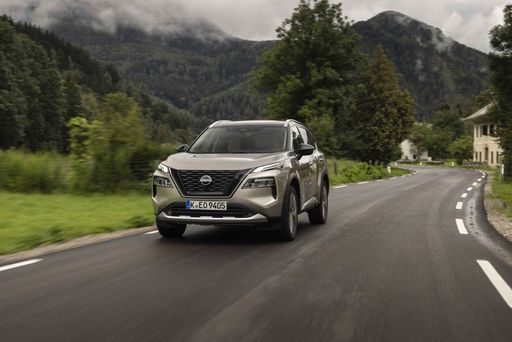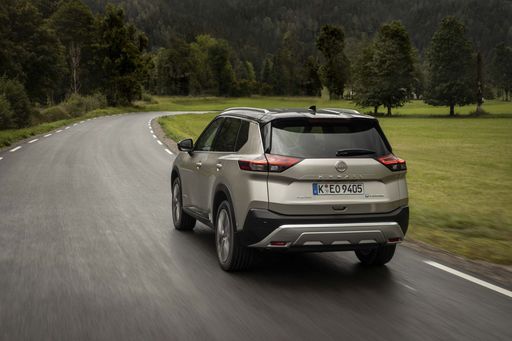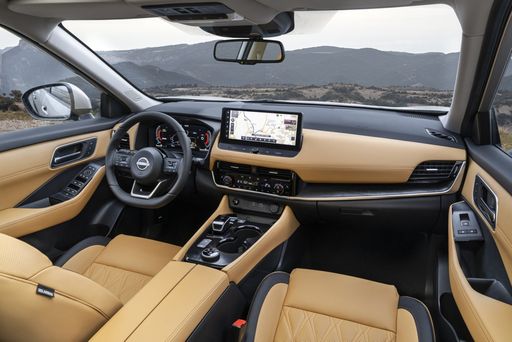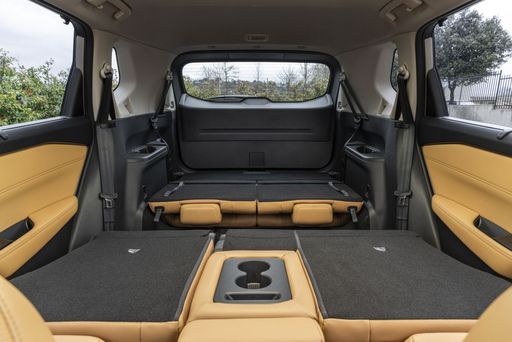Nissan X-Trail vs Toyota Yaris – Differences & prices compared
Compare performance, boot space, consumption and price in one view.
Find out now: which car is the better choice for you – Nissan X-Trail or Toyota Yaris?
The Nissan X-Trail (SUV) comes with a Petrol MHEV or Full Hybrid engine and Automatic transmission. In comparison, the Toyota Yaris (Hatchback) features a Full Hybrid or Petrol engine with Automatic or Manuel transmission.
When it comes to boot capacity, the Nissan X-Trail offers 585 L, while the Toyota Yaris provides 286 L – depending on how much space you need. If you’re looking for more power, decide whether the 213 HP of the Nissan X-Trail or the 280 HP of the Toyota Yaris suits your needs better.
In terms of consumption, the values are 5.70 L per 100 km for the Nissan X-Trail, and 3.80 L for the Toyota Yaris.
Price-wise, the Nissan X-Trail starts at 34000 £, while the Toyota Yaris is available from 21900 £. Compare all the details and find out which model fits your lifestyle best!
Nissan X-Trail
The Nissan X-Trail stands out with its spacious interior and practical design, making it an ideal choice for families and adventure enthusiasts alike. Its sleek exterior styling is complemented by modern technology features that enhance both driving pleasure and safety. This versatile SUV offers a comfortable ride, whether navigating city streets or exploring off-road paths, ensuring you travel in style and comfort.
details @ germany.nissannews.com
@ germany.nissannews.com
 @ germany.nissannews.com
@ germany.nissannews.com
 @ germany.nissannews.com
@ germany.nissannews.com
 @ germany.nissannews.com
@ germany.nissannews.com
Toyota Yaris
The Toyota Yaris exudes a charming blend of practicality and style, making it an appealing choice for urban drivers. Its compact design allows for easy manoeuvrability in crowded city streets, while the interior offers a surprisingly spacious and comfortable environment. With a focus on fuel efficiency and reliability, the Yaris remains a popular option for those seeking a balance between performance and economy.
details @ Toyota
@ Toyota
 @ Toyota
@ Toyota

|

|
|
|
|
Costs and Consumption |
|
|---|---|
|
Price
34000 - 50400 £
|
Price
21900 - 45000 £
|
|
Consumption L/100km
5.7 - 6.9 L
|
Consumption L/100km
3.8 - 9.5 L
|
|
Consumption kWh/100km
-
|
Consumption kWh/100km
-
|
|
Electric Range
-
|
Electric Range
-
|
|
Battery Capacity
-
|
Battery Capacity
-
|
|
co2
131 - 161 g/km
|
co2
87 - 215 g/km
|
|
Fuel tank capacity
55 L
|
Fuel tank capacity
36 - 50 L
|
Dimensions and Body |
|
|---|---|
|
Body Type
SUV
|
Body Type
Hatchback
|
|
Seats
5 - 7
|
Seats
4 - 5
|
|
Doors
5
|
Doors
3 - 5
|
|
Curb weight
1668 - 1961 kg
|
Curb weight
1090 - 1356 kg
|
|
Trunk capacity
177 - 585 L
|
Trunk capacity
141 - 286 L
|
|
Length
4680 mm
|
Length
3940 - 3995 mm
|
|
Width
1840 mm
|
Width
1745 - 1805 mm
|
|
Height
1720 mm
|
Height
1455 - 1500 mm
|
|
Payload
432 - 574 kg
|
Payload
289 - 525 kg
|
Engine and Performance |
|
|---|---|
|
Engine Type
Petrol MHEV, Full Hybrid
|
Engine Type
Full Hybrid, Petrol
|
|
Transmission
Automatic
|
Transmission
Automatic, Manuel
|
|
Transmission Detail
-
|
Transmission Detail
Manual Gearbox, Automatic Gearbox, CVT
|
|
Drive Type
Front-Wheel Drive, All-Wheel Drive
|
Drive Type
Front-Wheel Drive, All-Wheel Drive
|
|
Power HP
163 - 213 HP
|
Power HP
116 - 280 HP
|
|
Acceleration 0-100km/h
7 - 9.6 s
|
Acceleration 0-100km/h
5.5 - 9.7 s
|
|
Max Speed
170 - 200 km/h
|
Max Speed
175 - 230 km/h
|
|
Torque
300 - 525 Nm
|
Torque
390 Nm
|
|
Number of Cylinders
3
|
Number of Cylinders
3
|
|
Power kW
120 - 157 kW
|
Power kW
85 - 206 kW
|
|
Engine capacity
1497 cm3
|
Engine capacity
1490 - 1618 cm3
|
General |
|
|---|---|
|
Model Year
2024
|
Model Year
2024 - 2025
|
|
CO2 Efficiency Class
F, D, E
|
CO2 Efficiency Class
B, G
|
|
Brand
Nissan
|
Brand
Toyota
|
Nissan X-Trail
A New Era for the Nissan X-Trail
The 2024 Nissan X-Trail ushers in a new era of innovation and performance, catering to modern drivers who seek versatility, efficiency, and cutting-edge technology. With its striking design and advanced hybrid technologies, the X-Trail is poised to capture the interest of SUV enthusiasts around the globe.
Innovative Powertrains
Nissan has equipped the X-Trail with an array of innovative powertrains to meet diverse driving needs. Options include both mild-hybrid and full-hybrid technologies, with a 1.5 VC-T engine at the heart of its power delivery. Offering up to 213 PS, the X-Trail’s hybrid systems promise a blend of performance and efficiency, with fuel consumption ranging from 5.7 to 6.9 L/100km.
Seamless All-Wheel Drive
One of the standout features of the X-Trail is its seamless all-wheel-drive system, dubbed e-4ORCE. This advanced system ensures optimal traction and stability, providing confidence across various terrains and weather conditions. Available in selected trims, it complements the robust, SUV design perfectly.
Designed for Comfort and Functionality
The X-Trail offers a spacious interior, designed to seat up to seven passengers comfortably. With multiple seating configurations and a boot capacity ranging from 177 to 585 litres, it is ideal for family outings and adventurous road trips. The interior is designed with a focus on ergonomic comfort and intuitive technology, featuring advanced infotainment systems that keep drivers connected on the move.
Technological Advancements
The 2024 X-Trail boasts an impressive suite of technological advancements, including Nissan’s ProPILOT system. This driver assistance technology makes highway driving safer and more comfortable by helping control acceleration, braking, and steering within a single lane. Combined with the latest safety features, such as automatic emergency braking and blind-spot monitoring, the X-Trail sets a new standard in vehicle safety.
Efficiency Meets Performance
The 2024 Nissan X-Trail is engineered to provide a balance of efficiency and performance. With a range of CO2 efficiency classes from E to F, it positions itself as both an eco-friendly and powerful option within the SUV segment. Moreover, the smooth CVT transmission ensures a dynamic drive that adapaits to the driver's needs, whether navigating city streets or exploring off-road trails.
Conclusion
In conclusion, the Nissan X-Trail offers a compelling package for SUV buyers, blending cutting-edge hybrid technology, advanced safety features, and versatile design. It stands as a testament to Nissan’s commitment to innovation and continues to push the boundaries of what an SUV can offer in the modern age.
Toyota Yaris
Introducing the Next-Gen Toyota Yaris: A Blend of Innovation and Technology
The Toyota Yaris has long been lauded for its efficiency, reliability, and practicality. As we venture into the 2024 model year, Toyota has upped the ante with the latest versions of this popular hatchback, melding cutting-edge technology with eco-conscious design. Here’s an in-depth look at what makes the current Yaris line-up stand out from the crowd.
Efficient Powertrains: Hybrid and Beyond
Spearheading the technological innovation in the Yaris range is the introduction of various hybrid models. The Yaris offers a 1.5-litre full-hybrid engine, marrying a petrol engine with an electric motor to produce between 116 and 130 PS. This power blend is controlled via a sophisticated CVT-gearbox, optimizing both performance and fuel efficiency, with consumption figures ranging from an impressive 3.8 to 4.2 litres per 100 km.
For those seeking pure performance, the GR Yaris variants provide a turbocharged 1.6-litre engine capable of producing 280 PS. This power is delivered via a choice of manual or automatic transmission, giving drivers the tactile involvement or convenience they desire.
Design that Fulfils and Inspires
The Yaris hasn't forgotten its roots as a compact, city-friendly hatchback, measuring between 3,940 and 3,995 mm in length. With its bold front grille, sleek lines, and a choice of striking colours, it's a car that turns heads while remaining perfectly suited for urban environments.
The interior is equally impressive, designed with a focus on driver convenience and comfort. Depending on the variant, Yaris can offer generous cargo space of up to 286 litres, making it a perfect companion for everyday tasks or weekend escapes.
Technological Integration: The Smart Choice
Toyota's approach goes beyond just improving engine technology; the Yaris is packed with innovative features aimed at enhancing the driving experience. It boasts a suite of advanced safety systems such as lane departure alert, pre-collision system, and adaptive cruise control, ensuring peace of mind on the road.
The infotainment system in the Yaris is designed to keep you connected, offering seamless smartphone integration, a user-friendly interface, and an intuitive navigation system, ensuring that you're always informed and entertained.
The Cost of Innovation
Owning a Yaris is not just about impressive technology; it's also about making economic sense. With a price range between €25,500 and €49,990, and monthly costs spanning from €748 to €1,513, it offers a broad spectrum to suit different budget needs.
Concerned about emissions? You can rest easy knowing that the Yaris boasts a CO2 efficiency class ranging from B to G, thanks to its low emissions output of between 87 to 215 g/km.
Conclusion: The Toyota Yaris Drives the Future
The Toyota Yaris continues to be a strong contender in the compact car segment, pushing boundaries with its innovative full-hybrid systems and performance-oriented GR models. It's a remarkable blend of design, technology, and economy, ensuring it remains a top choice for drivers who demand more from their hatchbacks.
Whether you're seeking the efficiency of a hybrid or the thrill of the GR Yaris, there's a model tailored to your unique driving needs in Toyota's latest Yaris lineup.
Which drive types are available for the Nissan X-Trail?
Available as Front-Wheel Drive or All-Wheel Drive.
The prices and data displayed are estimates based on German list prices and may vary by country. This information is not legally binding.
